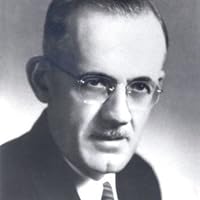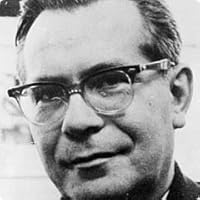Evangelicalism Quotes
Quotes tagged as "evangelicalism"
Showing 1-30 of 51

“I have a foreboding of an America in my children's or grandchildren's time -- when the United States is a service and information economy; when nearly all the manufacturing industries have slipped away to other countries; when awesome technological powers are in the hands of a very few, and no one representing the public interest can even grasp the issues; when the people have lost the ability to set their own agendas or knowledgeably question those in authority; when, clutching our crystals and nervously consulting our horoscopes, our critical faculties in decline, unable to distinguish between what feels good and what's true, we slide, almost without noticing, back into superstition and darkness...
The dumbing down of American is most evident in the slow decay of substantive content in the enormously influential media, the 30 second sound bites (now down to 10 seconds or less), lowest common denominator programming, credulous presentations on pseudoscience and superstition, but especially a kind of celebration of ignorance”
― The Demon-Haunted World: Science as a Candle in the Dark
The dumbing down of American is most evident in the slow decay of substantive content in the enormously influential media, the 30 second sound bites (now down to 10 seconds or less), lowest common denominator programming, credulous presentations on pseudoscience and superstition, but especially a kind of celebration of ignorance”
― The Demon-Haunted World: Science as a Candle in the Dark

“Evangelicalism has taken the Extrovert Ideal to its logical extreme...If you don't love Jesus out loud, then it must not be real love. It's not enough to forge your own spiritual connection to the divine; it must be displayed publicly.”
― Quiet: The Power of Introverts in a World That Can't Stop Talking
― Quiet: The Power of Introverts in a World That Can't Stop Talking

“...the cross of popular evangelicalism is not the cross of the New Testament. It is, rather, a new bright ornament upon the bosom of a self-assured and carnal Christianity whose hands are indeed the hands of Abel, but whose voice is the voice of Cain. The old cross slew men; the new cross entertains them. The old cross condemned; the new cross amuses. The old cross destroyed confidence in the flesh; the new cross encourages it. The old cross brought tears and blood; the new cross brings laughter. The flesh, smiling and confident, preaches and sings about the cross; before the cross it bows and toward the cross it points with carefully staged histrionics--but upon that cross it will not die, and the reproach of that cross it stubbornly refuses to bear.”
― The Divine Conquest
― The Divine Conquest

“Pastor Ted and other evangelical pastors I hear about in the media seem to perceive just about everything to be a threat against Christianity. Evolution is a threat. Gay marriage is a threat. A swear word uttered accidentally on television is a threat. Democrats are a threat. And so on.
I don't see how any of these things pose a threat against Christianity. If someone disagrees with you about politics, or social issues, or the matter of origins, isn't that just democracy and free speech in action? How do opposing viewpoints constitute a threat?”
― I Sold My Soul on eBay: Viewing Faith through an Atheist's Eyes
I don't see how any of these things pose a threat against Christianity. If someone disagrees with you about politics, or social issues, or the matter of origins, isn't that just democracy and free speech in action? How do opposing viewpoints constitute a threat?”
― I Sold My Soul on eBay: Viewing Faith through an Atheist's Eyes

“As Peter Berger has noted, the strategy of apologizing for Christian faith by trying to demonstrate its social utility is always eventually self-liquidating. Sooner of later people realize that a great many of the supposedly practical and secular benefits of the Christian religion can be had more easily without religion...The logic of practical atheism may well be more deeply ingrained in the evangelical tradition than conservatives perhaps have realized.”
― The Way of the (Modern) World: Or, Why It's Tempting to Live As If God Doesn't Exist
― The Way of the (Modern) World: Or, Why It's Tempting to Live As If God Doesn't Exist

“To put it most simply, the evangelical ethos is activistic, populist, pragmatic, and utilitarian. It allows little space for broader or deeper intellectual effort because it is dominated by the urgencies of the moment.”
― The Scandal of the Evangelical Mind
― The Scandal of the Evangelical Mind

“Finally, the work of the minister tended to be judged by his success in a single area - the saving of souls in measurable numbers. The local minister was judged either by his charismatic powers or by his ability to prepare his congregation for the preaching of some itinerant ministerial charmer who would really awaken its members. The 'star' system prevailed in religion before it reached the theater. As the evangelical impulse became more widespread and more dominant, the selection and training of ministers was increasingly shaped by the revivalist criterion of ministerial merit. The Puritan ideal of the minister as an intellectual and educational leader was steadily weakened in the face of the evangelical ideal of the minister as a popular crusader and exhorter. Theological education itself became more instrumental. Simple dogmatic formulations were considered sufficient. In considerable measure the churches withdrew from intellectual encounters with the secular world, gave up the idea that religion is a part of the whole life of intellectual experience, and often abandoned the field of rational studies on the assumption that they were the natural province of science alone. By 1853 an outstanding clergyman complained that there was 'an impression, somewhat general, that an intellectual clergyman is deficient in piety, and that an eminently pious minister is deficient in intellect.”
― Anti-Intellectualism in American Life
― Anti-Intellectualism in American Life
“The efforts spent on defending our turf in the culture wars could be better served on loving our neighbor as ourselves.”
― Still Evangelical? Ten Insiders Reconsider Political, Social, and Theological Meaning
― Still Evangelical? Ten Insiders Reconsider Political, Social, and Theological Meaning
“It was evangelicals' sense of rudderlessness - their desire for an authority to guide them in questions of dogma, life, and worship - that led them to rediscover liturgy and history in the first place. The irony was that in their smorgasbord approach to non-Protestant tradition, in their individualistic rejection of the rules of any one church in favor of a free run of the so-called church universal, in their repudiation of American nationalism in favor of cosmopolitanism, young evangelicals were being quintessentially evangelical and stereotypically American, doing as they pleased according to no authority but their own. The principle of sola scriptura was far clearer in theory than in practice. No matter evangelicals' faith that, with the 'illumination of the Holy Spirit,' 'Scripture could and should interpret itself,' too many illuminated believers came to different conclusions about what the Bible meant. Inerrantists who asserted their 'literal' interpretation with absolute certainty could do so only by covertly relying on modern, manmade assumptions. Other evangelicals were now searching for similar assurance in the authority of church history and the mystery of worship.”
― Apostles of Reason: The Crisis of Authority in American Evangelicalism
― Apostles of Reason: The Crisis of Authority in American Evangelicalism

“Whenever we are tempted to despair about the shape of American Christianity, we should remember that Jesus never promised the triumph of the American church. He promised the triumph of the church. .”
― Onward: Engaging the Culture without Losing the Gospel
― Onward: Engaging the Culture without Losing the Gospel

“Evangelicalism has taken the Extrovert Ideal to its logical extreme, McHugh is telling us. If you don’t love Jesus out loud, then it must not be real love. It’s not enough to forge your own spiritual connection to the divine; it must be displayed publicly. Is it any wonder that introverts like Pastor McHugh start to question their own hearts?”
― Quiet: The Power of Introverts in a World That Can't Stop Talking
― Quiet: The Power of Introverts in a World That Can't Stop Talking
“Those who would argue for the infallibility or the inerrancy of scripture logically should also claim the same infallibility for the churches in the fourth and fifth centuries, whose decisions and historical circumstances left us with our present canon. This is apparently what would be required if we were to only acknowledge the twenty-seven NT books that were set forth by the church in that context. Was the church in the Nicene and post-Nicene eras infallible in its decisions or not?
(Formation of Christian Biblical Canon)”
―
(Formation of Christian Biblical Canon)”
―
“As Wade Clark Roof noted in his study, "the 'weightlessness' of contemporary belief in God is a reality...for religious liberals and many evangelicals.”
―
―

“Descriptions all fall flat and tame unless the Holy Ghost fills them with life and power”
― Morning and Evening, Based on the English Standard Version
― Morning and Evening, Based on the English Standard Version

“My first real encounter with conservative evangelicals did not go well for them or for me. Serving as my seminary's faculty adviser to the InterSeminary Movement (ISM), I led a small delegation to a large regional meeting of the ISM students at the Southewestern Baptist Theological Seminary (SWBTS) in Ft. Worth. SWBTS was and is the largest seminary in the nation. They were Baptist conservatives, and our delegates were ecumenical liberals. Asked to deliver a plenary address during their chapel hour before a vast audience of about a thousand students, I prepared an avant garde speech more suited for a rally than a worship service.
When I entered that huge space, I faced the largest crowd I have ever addressed and felt like a goldfish in a swarm of piranhas. The president, Dr. Robert Naylor, who was a man with a gently spirit and fixed convictions, introduced me. My prepared remarks were focused on the work of Dietrich Bonhoeffer, whose prison letters were being widely read by theological student at the time. I explained and defended Bonhoeffer's concept of "religionless Christianity." Deep into a romanticized view of secularization under the tutelage of the Dutch theologian Gerardus van der Leeuw, the prevailing slogan was "Let the world set the agenda." In the austere atmosphere of that most conservative Baptist seminary, I proceeded to set forth an appeal to "worldly theology" as a new or promising basis for seminarians of different viewpoints to come together. My stated purpose was to advance Christian unity, but that's not what happened.
As I finished my presentation, President Naylor rose, quieted the restless audience and expressed polite appreciation of the intent of my address. He then began extemporaneously and with genuine rhetorical elegance to take on point by point the substance of my speech. In his warm, congenial and pastoral away, he deftly refuted practically every argument I had made. After the service, with great charm President Naylor again grasped my hand warmly and expressed his gratitude for my presence on Seminary Hill. I went away feeling trounced by an aging wise man of gracious and articulate Southern culture. That encounter helped me realize that conservative evangelical thinking was capable of real intellectual force, contrary to all of my previously fixed stereotypes of it.”
― A Change of Heart: A Personal and Theological Memoir
When I entered that huge space, I faced the largest crowd I have ever addressed and felt like a goldfish in a swarm of piranhas. The president, Dr. Robert Naylor, who was a man with a gently spirit and fixed convictions, introduced me. My prepared remarks were focused on the work of Dietrich Bonhoeffer, whose prison letters were being widely read by theological student at the time. I explained and defended Bonhoeffer's concept of "religionless Christianity." Deep into a romanticized view of secularization under the tutelage of the Dutch theologian Gerardus van der Leeuw, the prevailing slogan was "Let the world set the agenda." In the austere atmosphere of that most conservative Baptist seminary, I proceeded to set forth an appeal to "worldly theology" as a new or promising basis for seminarians of different viewpoints to come together. My stated purpose was to advance Christian unity, but that's not what happened.
As I finished my presentation, President Naylor rose, quieted the restless audience and expressed polite appreciation of the intent of my address. He then began extemporaneously and with genuine rhetorical elegance to take on point by point the substance of my speech. In his warm, congenial and pastoral away, he deftly refuted practically every argument I had made. After the service, with great charm President Naylor again grasped my hand warmly and expressed his gratitude for my presence on Seminary Hill. I went away feeling trounced by an aging wise man of gracious and articulate Southern culture. That encounter helped me realize that conservative evangelical thinking was capable of real intellectual force, contrary to all of my previously fixed stereotypes of it.”
― A Change of Heart: A Personal and Theological Memoir

“Since when is solitude one of the Seven Deadly Sins? But to a fellow evangelical, McHugh's sense of spiritual failure would make perfect sense. Contemporary evangelicalism says that every person you fail to meet and proselytize is another soul you might have saved. It also emphasizes building community among confirmed believers, with many churches encouraging (or even requiring) their members to join extracurricular groups organized around every conceivable subject—cooking, real-estate investing, skateboarding. So every social event McHugh left early, every morning he spent alone, every group he failed to join, meant wasted chances to connect with others.”
― Quiet: The Power of Introverts in a World That Can't Stop Talking
― Quiet: The Power of Introverts in a World That Can't Stop Talking

“I bring an unaccustomed wine
To lips long parching, next to mine,
And summon them to drink.
Crackling with fever, they essay;
I turn my brimming eyes away,
And come next hour to look.
The hands still hug the tardy glass;
The lips I would have cooled, alas!
Are so superfluous cold,
I would as soon attempt to warm
The bosoms where the frost has lain
Ages beneath the mould.
Some other thirsty there may be
To whom this would have pointed me
Had it remained to speak.
And so I always bear the cup
If, haply, mine may be the drop
Some pilgrim thirst to slake, —
If, haply, any say to me,
"Unto the little, unto me,"
When I at last awake.”
―
To lips long parching, next to mine,
And summon them to drink.
Crackling with fever, they essay;
I turn my brimming eyes away,
And come next hour to look.
The hands still hug the tardy glass;
The lips I would have cooled, alas!
Are so superfluous cold,
I would as soon attempt to warm
The bosoms where the frost has lain
Ages beneath the mould.
Some other thirsty there may be
To whom this would have pointed me
Had it remained to speak.
And so I always bear the cup
If, haply, mine may be the drop
Some pilgrim thirst to slake, —
If, haply, any say to me,
"Unto the little, unto me,"
When I at last awake.”
―
“The problem with carnal anger and outrage is that it’s one of the easiest sins to commit while convincing oneself that one is being faithful. . . . how many angry, divisive, perpetually outraged Christians are convinced that they are reincarnated Old Testament prophets, calling down fire from heaven? Now to be sure there is a time to call down fire from heaven . . . The prophets of Baal called down fire from heaven too, and they screamed and raved for a fire that never fell (1 Kings 18:29). James and John . . . wanted to call down fire from heaven on the Christ-rejecting villages of Samaria. Jesus wanted nothing to do with that spirit because he saw it for what it really was (Luke 9:54ff).”
―
―

“Every (Christian) generation has a choice: to go out like [King] Saul or to go out like Paul.”
― Onward: Engaging the Culture without Losing the Gospel
― Onward: Engaging the Culture without Losing the Gospel

“His [brother in law Jim Hampson] appointment to the Episcopal parish in Wenham, near Gordon College brought them in close touch with leading evangelical faculty members in their pews and church leadership, including Elizabeth Elliot and Addison Leitch. They were instrumental in drawing Jim and and Sarah into the cutting edge of evangelical intellectual leadership, with friendships with Tom Howard and J.I. Packer. My ongoing relationship with Jim Packer, FitzSimons Allison and many other brilliant Anglican evangelicals would not have happened without Jim Hampson. His early influence on me in my transition from modern to classic Christian teaching was immense. While I was trying to demythologize Scripture, he was taking its plain meaning seriously. His strong preaching led him to become one of the founding sponsors and supporters of Trinity School of Ministry in Abridge, Pennsylvania...”
― A Change of Heart: A Personal and Theological Memoir
― A Change of Heart: A Personal and Theological Memoir
“Among Evangelical Christians, all of whom await the Second Coming of Jesus, there are historically two camps: postmillennialists and premillennialists. For most of the seventeenth and eighteenth centuries, most were of the "post" variety, meaning that they expected the Messiah's return after the thousand-year reign of peace. In order to hasten His arrival, they set out to create that harmonious world here and now, fighting for the abolition of slavery, prohibition of alcohol, public education, and women's literacy.
The chaos of the Civil War and industrialization caused many evangelicals to rethink their optimism. They determined that Jesus would actually arrive before the final judgment. Therefore any efforts toward a just society here on earth were futile; what mattered was perfecting one's faith. As historian Randall Balmer writes, these believers "retreated into a theology of despair, one that essentially ceded the temporal world to Satan and his minions.”
― The Man Who Quit Money
The chaos of the Civil War and industrialization caused many evangelicals to rethink their optimism. They determined that Jesus would actually arrive before the final judgment. Therefore any efforts toward a just society here on earth were futile; what mattered was perfecting one's faith. As historian Randall Balmer writes, these believers "retreated into a theology of despair, one that essentially ceded the temporal world to Satan and his minions.”
― The Man Who Quit Money

“Seems to me that for you, evangelicalism is like the boyfriend you broke up with two years ago, but whose Facebook page you still check compulsively.”
― Searching for Sunday: Loving, Leaving, and Finding the Church
― Searching for Sunday: Loving, Leaving, and Finding the Church

“People are down on Evangelicalism these days, but even my earliest years of life showed me that Evangelical churches are great at doing a whole lot of important things. When an active member of an Evangelical church dies, the family of the departed receives immense support during their grieving. Dealing with the influx of casseroles and baked hams delivered to the homes of the bereaved can become a logistical issue, and their grass is mowed as if by elves.
What I'm saying is that it's easy to stand on the outside and dismiss Evangelicals as crazy Fundamentalists, but this misses most of what the movement really is (or, at least, is supposed to be). I'm not an Evangelical anymore, but it was Evangelicals who showed me how to...be a good employee and how to live my life with integrity. And Evangelicals were there for me when my life fell apart.”
― Finding God in the Waves: How I Lost My Faith and Found It Again Through Science
What I'm saying is that it's easy to stand on the outside and dismiss Evangelicals as crazy Fundamentalists, but this misses most of what the movement really is (or, at least, is supposed to be). I'm not an Evangelical anymore, but it was Evangelicals who showed me how to...be a good employee and how to live my life with integrity. And Evangelicals were there for me when my life fell apart.”
― Finding God in the Waves: How I Lost My Faith and Found It Again Through Science
“If all you knew about Christianity came from a close reading of the New Testament, you’d expect that Christians would be hostile to wealth, emphatic in protection of justice, sympathetic to the point of personal pain toward the sick, persecuted and the migrant, and almost socialist in their economic practices. None of these consistent Christian themes served the interests of slave owners, so pastors could either abandon them, obscure them, or flee.”
―
―
“This is the biggest scandal in the story of Pat Robertson. Whatever one thinks of his religious or political views, the fact remains that he raised millions of dollars from his viewers, most of whom were elderly, and then took their money to create a business that was sold for almost $2 billion. What is most surprising about this scandal is that nobody cared. The evangelical world did not seem to notice, and the federal government was only concerned with legal actions, even if they were morally questionable. Democratic congressman Pete Stark said that the sale of the Family Channel was an example of 'transactions in which individuals have enriched themselves at the public’s expense while nonprofit organizations have been looted.”
― Pat Robertson: An American Life
― Pat Robertson: An American Life

“Somewhere along the line, I had bought into the idea, so pervasive in evangelical culture, that reading the right books and listening to the right music will make you ("inspire you to be") a better Christian. Somehow, I had confused the trappings of faith with faith itself.”
―
―

“Westerners instinctively consider wealth an unlimited resource. There’s more than enough to go around, we believe. Everyone could be wealthy if they only tried hard enough. So if you don’t have all the money you want, it’s because you lack the virtues required for success—industry, frugality and determination. A nineteenth-century biographer of George Washington put the matter this way: “In a land like this, which Heaven has blessed above all lands . . . why is any man hungry, or thirsty, or naked, or in prison? why but through his unpardonable sloth?”[17] There appears to have been a trend from very early in American thought to invert Paul’s proverb “If a man will not work, he shall not eat” (2 Thess 3:10 NIV 1984) to read, “If a man can’t eat, it is because he doesn’t work.” People know what they need to do to make money, we think, so if they’re poor, they must deserve it.
This understanding of wealth is the very opposite of how many non-Western cultures view it. Outside the West, wealth is often viewed as a limited resource. There is only so much money to be had, so if one person has a lot of it, then everyone else has less to divide among themselves.”
― Misreading Scripture with Western Eyes: Removing Cultural Blinders to Better Understand the Bible
This understanding of wealth is the very opposite of how many non-Western cultures view it. Outside the West, wealth is often viewed as a limited resource. There is only so much money to be had, so if one person has a lot of it, then everyone else has less to divide among themselves.”
― Misreading Scripture with Western Eyes: Removing Cultural Blinders to Better Understand the Bible

“The novel [Pamela] is also a very powerful early expression of the modern self, one who sees her soul as equal in human worth and dignity to anyone, regardless of social class or power--and this, too, is part of evangelicalism.”
― The Evangelical Imagination: How Stories, Images, and Metaphors Created a Culture in Crisis
― The Evangelical Imagination: How Stories, Images, and Metaphors Created a Culture in Crisis

“Evangelicalism increasingly became a global culture. By the 2020s, the largest
congregations in the world were not in Texas or Georgia or California, but in Korea,
Nigeria, and Brazil.”
― Evangelicalism: A Very Short Introduction
congregations in the world were not in Texas or Georgia or California, but in Korea,
Nigeria, and Brazil.”
― Evangelicalism: A Very Short Introduction

“This is one of the great ironies of modern religion: more than almost any other religious group on the planet, conservative evangelicals, and most especially fundamentalist Christians, are children of the Enlightenment. [...] Among other things, the Enlightenment encouraged reasoned skepticism of every religious tradition that was based on the miraculous, the supernatural, and revelation. [...] When I say that conservative evangelical Christians and fundamentalists are children of the Enlightenment, I mean that more than almost anyone else, thinkers among these groups are committed to “objective truth”— which was precisely the commitment that led to the demise of Christianity in the modern world in the first place, especially in Europe. And so this evangelical commitment is ironic. Or maybe it’s a case of trying to fight fire with fire.”
― How Jesus Became God: The Exaltation of a Jewish Preacher from Galilee
― How Jesus Became God: The Exaltation of a Jewish Preacher from Galilee
All Quotes
|
My Quotes
|
Add A Quote
Browse By Tag
- Love Quotes 97k
- Life Quotes 75.5k
- Inspirational Quotes 72.5k
- Humor Quotes 43.5k
- Philosophy Quotes 29.5k
- Inspirational Quotes Quotes 27k
- God Quotes 26k
- Truth Quotes 23.5k
- Wisdom Quotes 23.5k
- Romance Quotes 23k
- Poetry Quotes 22k
- Death Quotes 20k
- Happiness Quotes 18.5k
- Life Lessons Quotes 18.5k
- Hope Quotes 18k
- Faith Quotes 18k
- Quotes Quotes 16.5k
- Inspiration Quotes 16.5k
- Spirituality Quotes 15k
- Religion Quotes 15k
- Motivational Quotes 15k
- Writing Quotes 14.5k
- Relationships Quotes 14.5k
- Life Quotes Quotes 14k
- Love Quotes Quotes 13.5k
- Success Quotes 13.5k
- Time Quotes 12.5k
- Motivation Quotes 12k
- Science Quotes 11.5k
- Knowledge Quotes 11k

